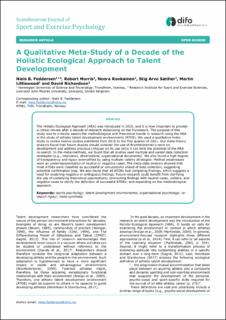| dc.contributor.author | Feddersen, Niels Boysen | |
| dc.contributor.author | Morris, Robert | |
| dc.contributor.author | Ronkainen, Noora | |
| dc.contributor.author | Sæther, Stig Arve | |
| dc.contributor.author | Littlewood, Martin A. | |
| dc.contributor.author | Richardson, David | |
| dc.date.accessioned | 2023-01-09T11:50:18Z | |
| dc.date.available | 2023-01-09T11:50:18Z | |
| dc.date.created | 2021-08-23T16:49:44Z | |
| dc.date.issued | 2021 | |
| dc.identifier.citation | Scandinavian Journal of Sport and Exercise Psychology (SJSEP). 2021, 3 24-39. | en_US |
| dc.identifier.issn | 2596-741X | |
| dc.identifier.uri | https://hdl.handle.net/11250/3041942 | |
| dc.description.abstract | The Holistic-Ecological Approach (HEA) was introduced in 2010, and it is now important to provide a critical review after a decade of research elaborating on the framework. The purpose of this study was to critically assess the methodological and theoretical trends in research using the HEA in the study of athletic talent development environments (ATDE). We used a qualitative meta-study to review twelve studies published from 2010 to the first quarter of 2021. Our meta-theory analysis found that future studies should consider the use of Bronfenbrenner’s work on development and address previous critiques on its use since it can limit the potential of the HEA re-search. In the meta-methods, we found that all studies used multiple and varied data collection strategies (e.g., interviews, observations, organisational documents). We also found a high degree of transparency and rigour exemplified by using multiple validity strategies. Method weaknesses were an underrepresentation of neutral or negative cases. The meta-data analysis showed that most ATDEs were classified as successful or unsuccessful ahead of data collection, suggesting potential confirmation bias. We also found that all ATDEs had competing findings, which suggests a need for exploring negative or ambiguous findings. Future research could benefit from clarifying the use of underlying theoretical assumptions; contrasting findings with neutral cases, outliers, and negative cases to clarify the definition of successful ATDEs; and expanding on the methodological approach. | en_US |
| dc.description.abstract | A Qualitative Meta-Study of a Decade of the Holistic Ecological Approach to Talent Development | en_US |
| dc.language.iso | eng | en_US |
| dc.publisher | Dansk Idrætspsykologisk Forum | en_US |
| dc.relation.uri | https://tidsskrift.dk/sjsep/article/view/128317 | |
| dc.rights | Navngivelse 4.0 Internasjonal | * |
| dc.rights.uri | http://creativecommons.org/licenses/by/4.0/deed.no | * |
| dc.title | A Qualitative Meta-Study of a Decade of the Holistic Ecological Approach to Talent Development | en_US |
| dc.title.alternative | A Qualitative Meta-Study of a Decade of the Holistic Ecological Approach to Talent Development | en_US |
| dc.type | Peer reviewed | en_US |
| dc.type | Journal article | en_US |
| dc.description.version | publishedVersion | en_US |
| dc.source.pagenumber | 24-39 | en_US |
| dc.source.volume | 3 | en_US |
| dc.source.journal | Scandinavian Journal of Sport and Exercise Psychology (SJSEP) | en_US |
| dc.identifier.doi | 10.7146/sjsep.v3i.128317 | |
| dc.identifier.cristin | 1928141 | |
| cristin.ispublished | true | |
| cristin.fulltext | original | |
| cristin.qualitycode | 1 | |

